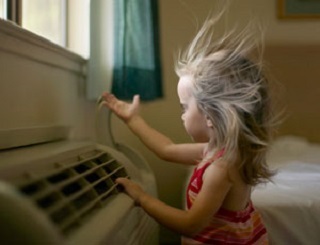From Guest Blogger Lizzie Weakly: Five Signs Your HVAC System is Energy Inefficient

Uncomfortable Room Temperature
Every time you turn the furnace or the air conditioner on, there are meters running that tally up energy usage. You should get the maximum comfort for your energy dollars. If one room is too hot while another is too cool, your HVAC system is operating inefficiently. It may just need an adjustment of the airflow through the ductwork, but it should be addressed in order for you to be comfortable since you are paying for every minute the furnace or AC is running.
Home Is Never Warm or Cool Enough
Some furnaces and air conditioning systems just never seem to be able to heat or cool a house enough to make it comfortable. This is when the entire house is uncomfortable rather than just one room. Maybe the furnace is doing a great job at heating, but the AC just cannot seem to cool the house in July and August. Maybe the AC is fine, but the furnace just cannot generate enough heat in January and February. Both situations are experienced in many homes that have furnaces and AC systems that are not sized correctly for the home they are supposed to be heating or cooling.
Constant Running
Furnaces and AC systems are designed to cycle on and off to maintain a consistent internal temperature of your home. The HVAC system relies on insulation and its ability to heat and cool effectively in order to operate at peak efficiency. Inadequate insulation can cause an HVAC system to cycle on and off very often in a home. The lack of insulation causes furnaces to have to come on again often as the house cools off too quickly. It is opposite for AC. The lack of insulation causes the house to warm up too quickly, making the AC come on much more often than it would otherwise need to. Though this is not the fault of the HVAC system, it still causes it to be energy inefficient.
Cycling On and Off Too Often
The typical American often thinks that bigger and more are better. This is not true of an HVAC system. Heating and cooling equipment should be tailored specifically to the home it is being installed in. The heating and cooling experts at companies like First Class Plumbing LLC. advise that an HVAC system that are cycling on and off too often will cause the system to become more inefficient. This is more pronounced with air conditioning and also interferes with an AC system’s ability to adequately dehumidify the air inside your home in the summer. When the compressor is pumping refrigerant to cool the evaporator lines, water in the air that strikes the coils condenses and dehumidifies your home. The efficiency of this is reduced if an oversized AC unit is constantly cycling the compressor on and off.
Low Air Flow
An undersized blower struggles to move enough air through all the ducts to provide adequate heating and cooling. Weak air flow can result in warmer areas closer to the HVAC system while rooms further away are too cold in the winter and too hot in the summer. Duct and vent dampers should be checked to make sure they are not closed when there is weak airflow before determining if the blower just cannot create enough cubic feet per minute of air volume to service the entire house. Low air flow makes for inefficiency by not adequately being able to carry heated or cooled air to all parts of your home effectively.
All of these signs of an inefficient HVAC system can be addressed and fixed by a trained heating and cooling specialist. Furnaces and air conditioning systems come with detailed specifications and instructions for their use and how much heating and cooling they can provide to a home. It is much more than just picking a brand you like. You need to have the most efficient system tailored for use in your home.
The Seasonal Energy Efficiency Rating (SEER) for AC systems goes by numbers. It is recommended to get one that operates at a SEER higher than 13. You can get one for your house that has a SEER of 21. Also, furnaces are rated by percentage of operational efficiency. There are ones available that operate at 97 percent energy efficiency. Compare that to what you have, and the energy savings of a new system could pay for itself over time.
